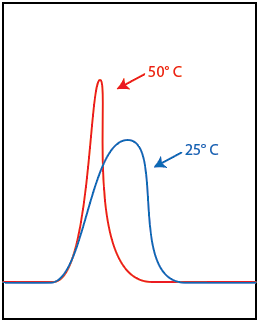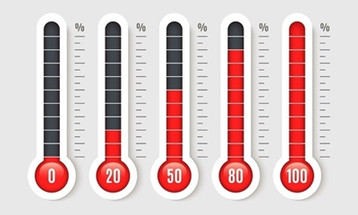Posted by Chrom Tech on 28th Oct 2025
How Does Column Temperature Affect HPLC Resolution?
By Chrom Tech – Your Chromatography Consumables Partner Since 1983
Overview
The temperature of an HPLC column plays a vital role in determining retention time, selectivity, peak shape, and system pressure. Proper temperature control ensures consistent separations, improved reproducibility, and optimized efficiency across your analyses. Whether operating at room temperature or elevated conditions, understanding the relationship between temperature and chromatographic behavior is key to achieving reliable results.
Temperature and Retention Time

Retention time is the duration it takes for an analyte to pass from injection to detection. In standard reversed-phase HPLC, columns are typically operated around 40°C. Increasing column temperature generally reduces retention due to decreased solvent viscosity and enhanced analyte diffusion—resulting in faster elution. Conversely, lowering temperature increases retention and may improve resolution for closely eluting compounds. In UHPLC systems, higher temperatures are particularly beneficial for reducing backpressure caused by smaller particle sizes.
Temperature and Selectivity
Column temperature can significantly affect selectivity, particularly for compounds with similar chemical structures. Adjusting temperature alters the equilibrium between analytes and the stationary phase, which may enhance or reduce separation efficiency. Subtle temperature changes (±2°C) can shift selectivity enough to optimize resolution for challenging mixtures.
Temperature Gradients and Peak Shape

As discussed by John Dolan in The Importance of Temperature, temperature gradients can cause peak distortion. When the mobile phase entering the column is cooler than the column itself, condensation and uneven heating may produce broad or tailing peaks. Using an HPLC solvent preheater—such as the HX-038-EXP inline heat exchanger—ensures thermal equilibrium and Gaussian-shaped peaks.
Why Temperature Control Matters
Maintaining stable column temperature minimizes variability and enhances reproducibility across runs. Even if elevated temperature isn’t required for your separation, consistent temperature control improves method ruggedness and retention-time precision. Temperature variation is one of the most common causes of inconsistent chromatographic results.
We recommend using a column sleeve to maintain the column temperature approximately 5°C above ambient conditions. This compensates for environmental fluctuations caused by seasonal changes, HVAC cycling, or lab placement. For higher-temperature methods, preheating the mobile phase eliminates temperature gradients and preserves peak integrity.
- Lower mobile phase viscosity reduces system pressure.
- Faster analyte migration shortens run times and increases productivity.
- Temperature adjustments can fine-tune selectivity for specific separations.
Pairing a heated HPLC column with a solvent heat exchanger or column compartment oven ensures consistent performance. For recommendations or pricing, contact info@chromtech.com.
 |
 |
Quick Reference: HPLC Column Temperature Effects
| Effect | Lower Temperature | Higher Temperature |
|---|---|---|
| Retention Time | Longer (slower elution) | Shorter (faster elution) |
| Selectivity | Reduced for certain analytes | Improved for complex mixtures |
| Peak Shape | Sharper with stable equilibration | Distorted if temperature gradient exists |
| System Pressure | Higher (increased viscosity) | Lower (reduced viscosity) |
Frequently Asked Questions
How does column temperature affect retention time?
Higher column temperatures decrease retention by improving analyte mobility and reducing solvent viscosity, allowing faster elution and shorter run times.
Can temperature change selectivity?
Yes. Temperature can shift equilibrium between analytes and the stationary phase, altering selectivity and improving resolution for certain mixtures.
What are temperature gradients and why do they matter?
Temperature gradients occur when the mobile phase is cooler than the column, leading to peak distortion. Preheating the mobile phase prevents this and ensures consistent, symmetrical peaks.
Why should I use a column sleeve or compartment oven?
Column sleeves and ovens stabilize temperature, reduce variability from ambient changes, and enhance reproducibility and pressure control.
What are the main benefits of elevated temperature in HPLC?
Elevated temperature reduces backpressure, shortens run time, and can improve resolution by enhancing analyte diffusion and selectivity.

